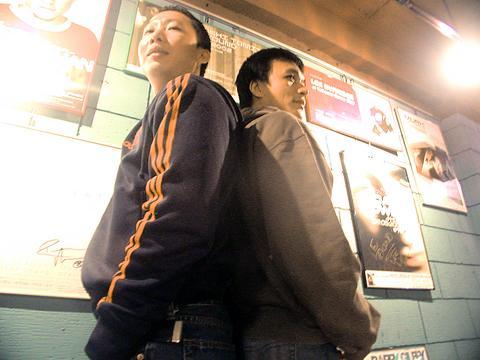Taiwan's longest-running dance club, the legendary TeXound has been hassled into submission and is bowing to police pressure with a final party tomorrow night, after which it will say adieu and close down for good.
The sound system that became the notorious underground club TeXound on the intersection of Jianguo South Road and Nanjing East Road and then morphed into the predominantly gay club across the road on Nanjing East Road, will be no more after tomorrow night's "Adieu, I Love TeXound."
"TeXoundians" may mourn and Taipei will lose its only licensed non-commercial electronic music club, but constant raids by the police have taken their toll and even full-on clubbers have become bored and scared off by ID checks, the threat of urine testing and being told to get face down on the floor for 30 minutes at a time.

PHOTO: JULES QUARTLY, TAIPEI TIMES
"TeXound is closing down because of the police problem. They come every single Friday and Saturday and it just makes the business really bad," said Jimmy Chen, a DJ and promoter from the club. "If I was a customer and I came twice and the same thing happened [a police raid], then I wouldn't come either."
"Taiwan's clubs always last for a short time, there's always an end. It's just like a relationship. I'm still going to be DJing and doing promotions, but not for TeXound. TeXound will be no more," Chen said.
Fellow DJ and TeXound founder Tiger agreed and said five years and four months was long enough for a club to do business and it was time to move on.

PHOTO: JULES QUARTLY, TAIPEI TIMES
"For me, I guess the best times were in 1999 and 2000, it was really underground and more mixed and there was plenty going on. It was exciting. Now I just want to rest for a while."
The 36-year-old has been DJing for 18 years and before starting TeXound was a resident at Kiss and at a gangster's dive called Queens, which wasn't gay at all.
"That was a mad place," Tiger said. "Sometimes when we went there it was crazy with fighting. One time, two gangs were facing off and the bottles were flying through the air as we played."
TeXound on Jianguo was known for pulling in the more raffish elements of society and also had a reputation for being connected with organized crime itself.
That didn't prevent TeXound becoming ever more popular, however, which was the reason it moved across the road to bigger premises.
Partly because of Chen and DJ Victor -- who are gay, proud of it and attract a large following to any club they play at -- TeXound became known as a late-night spot for taking your shirt off, sweating with hundreds of other men and passing out from male hormone overload.
The club was also connected with drugs. The high-profile arrests of Anya (
It opened again, fittingly enough, on Valentine's Day last year, but police action intensified, despite pulling in big-name DJs from abroad such as Richie Hawton, Satoshi Tomiie, Tom Stephan, Paulo Mojo and Lee Burridge.
Though TeXound was licensed -- "We paid a lot of money, to the authorities, the police, everyone," Chen said -- it could not avoid media opprobrium and police action.
The fact is, the city council and police had no power to close the club or suspend its water and electricity supplies, even though it was proven ecstasy was taken on the premises. But constant harassment by the police wore down the punters.
Tiger said he had plans for a new place that would feature progressive, tribal and tech house, and which would be more mixed, but still underground. He said TeXonians should keep their "Adieu, I love TeXound" flyers as holders would be given a "special surprise" in about three months.
In the meantime, for the last time, and head-to-head, it will be TeXound's top DJs: Main room 11pm to 1am Taco and Floyed go temple-to-temple, Gravity and Eric Huang from 1am to 3am, Victor Cheng and Jimmy Chen from 3am to 5am, Stone and Tiger duel it out 5am to 7am, and Joe and Teddy Dong battle to the end from 7am to 9am. In the X-Bar: Floyed, Teddy Dong and Eric Huang.

Under pressure, President William Lai (賴清德) has enacted his first cabinet reshuffle. Whether it will be enough to staunch the bleeding remains to be seen. Cabinet members in the Executive Yuan almost always end up as sacrificial lambs, especially those appointed early in a president’s term. When presidents are under pressure, the cabinet is reshuffled. This is not unique to any party or president; this is the custom. This is the case in many democracies, especially parliamentary ones. In Taiwan, constitutionally the president presides over the heads of the five branches of government, each of which is confusingly translated as “president”

Sept. 1 to Sept. 7 In 1899, Kozaburo Hirai became the first documented Japanese to wed a Taiwanese under colonial rule. The soldier was partly motivated by the government’s policy of assimilating the Taiwanese population through intermarriage. While his friends and family disapproved and even mocked him, the marriage endured. By 1930, when his story appeared in Tales of Virtuous Deeds in Taiwan, Hirai had settled in his wife’s rural Changhua hometown, farming the land and integrating into local society. Similarly, Aiko Fujii, who married into the prominent Wufeng Lin Family (霧峰林家) in 1927, quickly learned Hoklo (commonly known as Taiwanese) and

The Venice Film Festival kicked off with the world premiere of Paolo Sorrentino’s La Grazia Wednesday night on the Lido. The opening ceremony of the festival also saw Francis Ford Coppola presenting filmmaker Werner Herzog with a lifetime achievement prize. The 82nd edition of the glamorous international film festival is playing host to many Hollywood stars, including George Clooney, Julia Roberts and Dwayne Johnson, and famed auteurs, from Guillermo del Toro to Kathryn Bigelow, who all have films debuting over the next 10 days. The conflict in Gaza has also already been an everpresent topic both outside the festival’s walls, where

In the run-up to the referendum on re-opening Pingtung County’s Ma-anshan Nuclear Power Plant last month, the media inundated us with explainers. A favorite factoid of the international media, endlessly recycled, was that Taiwan has no energy reserves for a blockade, thus necessitating re-opening the nuclear plants. As presented by the Chinese-language CommonWealth Magazine, it runs: “According to the US Department of Commerce International Trade Administration, 97.73 percent of Taiwan’s energy is imported, and estimates are that Taiwan has only 11 days of reserves available in the event of a blockade.” This factoid is not an outright lie — that